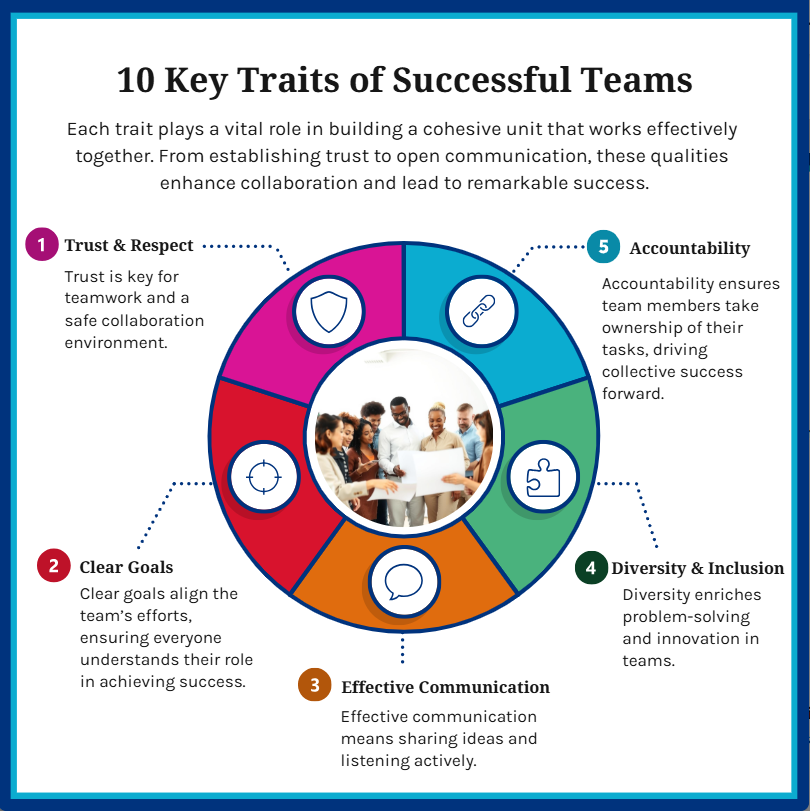10 Team Characteristics for Effective Teamwork
ByAngeli Yuson
Angeli is the Founder and COO at Workast. Her team ensures our users have an exceptional customer experience with Workast and takes care of all user issues.

Angeli is the Founder and COO at Workast. Her team ensures our users have an exceptional customer experience with Workast and takes care of all user issues.
For any kind of organization to succeed, effective teamwork is essential. It doesn’t matter if you are a band or running a small business: for anything to work, the members must know how to work together. With proper teamwork, delays will be reduced and productivity will increase.
But how do you know if the team you put together has the teamwork essentials down? Well, knowing the characteristics will certainly put you in the right direction. A competent team will typically show the following characteristics between its members.
Infographic made by write a paper for me.
Communication is one of the most important aspects of every relationship, whether it’s personal or professional. It makes way for camaraderie, creates a comfortable environment, and prevents misunderstandings.
Many teams end up going through problems and delays simply because they fail to communicate their thoughts or ideas, or because they refuse to listen to what the other person is saying. By listening, reacting, and asking for clarification, you will be more effective at delivering your ideas.
IT companies with ineffective teamwork may struggle with unclear objectives, leading their teams to work without a clear understanding of the broader vision. However, IT companies that foster effective teamwork ensure that every team member understands the company's goals, leading to better collaboration, innovation, and overall success.
When every team member has a clear direction of their goal, they will know how to find the best ways to get there. If a simpler alternative comes by, they will know to use it, because they already know the goal. This will drive the members to put in more effort to reach the desired outcome. Furthermore, creating an FAQ page can serve as a central hub for clear direction when doubts arise. It makes the information readily available and equips team members to independently find answers, reinforces key project goals, and reduces instances of confusion or wasted time spent seeking clarification. This streamlined access to knowledge can be further optimized through effective corporate training, ensuring that employees are proficient in utilizing available resources to their fullest potential
In an effective team, the decisions are reached by consensus – this means that everyone is usually in general agreement and they agree to go along with the set plan. Formal voting is not necessary, as the teams are able to reach a consensus quite fast.
HR software, developed by a software development company, can significantly enhance teamwork by offering centralized tools for communication, task management, and performance tracking. It creates a unified platform where team members can collaborate seamlessly, share updates, and monitor progress toward shared goals. These tools not only improve efficiency but also ensure transparency, fostering a culture of trust and accountability within the team.
For example, Zelt's all-in-one HR software provides features that simplify team coordination, making it easier for members to stay aligned and achieve optimal results. Similarly, HR tools like Empxtrack play a key role in performance management by helping teams set goals, track progress, and effectively evaluate outcomes.
A team that doesn’t have the teamwork down will see an elephant in the room and leave the problem there for someone else to find, because “it’s not their problem.” These teams will also be masters at the blame game.
However, a team that has effective teamwork in place will see the problem and try to solve it before it gets worse – even if it’s not technically “their problem.” These teams accept responsibility, no matter if it’s for individuals or the team. And just like they are accountable for potential mistakes, they will also celebrate their success together.
No matter how much you try, there will always be problems and potential failures within a team. Mistakes may happen, ideas may not work in the way that they should. However, an effective team will never give personal criticism or play the blame game, with the “you are always like this” card. Instead, they will be oriented on the issue and offer constructive criticism on how to solve the problem, balancing matters with positive feedback to raise morale.
We’ve established that an effective team needs to be open and communicative, but even the best environment requires some organization and a clear road. The skill sets of every person and their thinking style will help delegate the roles they will have within the team.
For instance, let’s say that you need to develop a new product. Your team will require someone with great attention to detail who can keep the other members on the right track. Another person may have the role of the explorer, so they can look into possibilities. Visualizing these roles with tools like flow diagrams can make it easier to map responsibilities, improve clarity, and spot gaps in team structure. Each team member is different and may have a different contribution, but they all need to be aware of what their role is.
Having a clear direction and a common goal is very important to a well-playing team, but it should not lead to the suppression of opinions and alternative ideas. If someone has different ideas within the team, it means that the team is diverse and may very well give you a competitive advantage.
Certain cultural cycles may say that “rules are meant to be broken,” but in the world of teamwork, rules are meant to be respected. Without rules, the entire project may go into chaos, and the team members may not be able to stay on track.
While an out-of-the-box idea may not always be bad, it needs to be within the boundaries of set rules – rules that everyone needs to know about before they even begin working on that project. This may include meetings, schedules, deadlines, limits, and more. Their absence will only lead to ambiguity, which can further lead to conflict in the future.
Change can be scary, and the same can be said about taking risks. However, a team that supports certain risks in order to lead to improvement is a team that works well together. It means that members trust one another to try out these ideas, even if they may not always be right. That being said, if the risk-taking process leads to a better opportunity, then that team will be able to do great things in the future.
For example, the team may be in charge of a trading platform in Australia and the plan would be to expand to the US. There are not that many CFD brokers that accept US residents, so making a plan to expand that way might prove beneficial to the company.
If the people on a team have different values or norms of behavior, then there is a good chance there might be disagreement circumstances. An effective team will share core values of conduct, having the same ability to determine right from wrong.
The Bottom Line
A powerful team is one with clear objectives and set rules – one where the members know how to collaborate respectfully and constructively. For teamwork to be effective, the above-mentioned characteristics are important for every team member.
